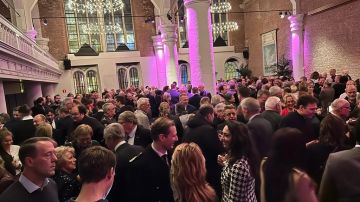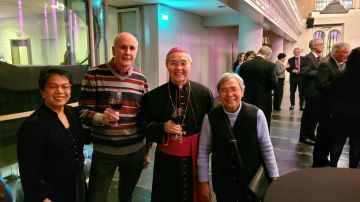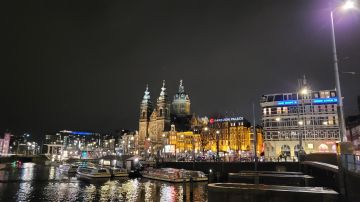Building a civilisation of love
A word at the Evensong - New Year's reception 2024



On the 12th of january we celebrated an Evensong in the basilica of Saint Nicholas in Amsterdam and we were together for our New Years's reception in the adjacent hotel. It was again a beautiful event, in which many people took part. A nice start of the new year. Our world however is not so nice and calm. How can we build a "civilisation of love"?
This is the sermon I gave during the Evensong in the basilica:
Out commitment
A word at the Evensong - New Year's reception 2024
Excellencies, Ladies and gentlemen, brothers and sisters,
I warmly welcome you all to this Evensong at the beginning of the New Year's Reception of our Diocese and the Military Ordinariate.
Our commitment
We are at the beginning of a new year and in this celebration we ask for strength and God's blessing to be able to do the good, that which is beneficial.
I thank you all for your commitment to this, especially those who work to shape and pass on the message of the Gospel in the Military Ordinariate and the Diocese of Haarlem-Amsterdam, in the parishes and elsewhere.
Families - Youth - Central places in the diocese - what about our churches?
In particular, we want to pay attention in our diocese to communion with the Lord and with each other, to families and young people. We are grateful for the family days that have started in many places in our diocese, for the youth activities - this year began with a beautiful youth trip to Fulda and at the end of this month there will be WJD@home - for the initiatives in the field of caritas and in the three central places in our diocese: the shrine of Our Lady ter Nood, this basilica and the St Bavo Cathedral in Haarlem.
There are also painful processes, especially the sadness that we cannot keep all churches due to reductions in the number of believers, volunteers and finances; this affects people. We would like to walk a path of faith with believers' participation, of course within the actual reasonable possibilities.
Outreach
At the same time, we want to engage with people who are further removed from church life. The chaplains of the Military Ordinariate have a special and beautiful position in this, close to young people of our time, inspiring them, standing beside them often at emotive moments and connecting them to the message of the Gospel. Their pastoral closeness is a precious commodity.
Connection
So, I warmly welcome you all! We are convinced that it is good and important to create opportunities to meet each other. We want to seek connection, join people and forces, realising that our mission as human beings and Christians extends beyond the churchyard.
A civilisation of love
For, that mission is about establishing "a civilisation of love", as the vision developed in Catholic social teaching indicates. I am therefore particularly grateful to those who made this New Year's reception possible through their commitment and financial contribution.
What is the dignity of the human person?
The core and foundation of Catholic social teaching is the dignity of human beings created in the image and likeness of God. God is love, says the Bible (1 Jo. 4, 8) and God is relationship, a triune God. Thus, human beings are essentially social and called to maintain relationships of cordial and serving love.
Anniversaries
This year we celebrate the special anniversary of several Church documents dealing with these themes, including the 50th anniversary of the Pontifical Council Iustitia et Pax's document on the Church and human rights, the 30th anniversary of the same Council's document on the international arms trade, the 40th anniversary of the International Theologians' Commission's Theses on the Dignity and Rights of Man, and the 20th anniversary of the Instruction on the Care of Migrants. And Pope Francis speaks with great regularity on all sorts of issues of war and peace and human dignity. Sixty years ago, the Second Vatican Council talked about religious freedom and concern for peace, trying to cultivate a peace mentality and preventing war.
Surprisingly topical
The painful thing is that all these documents are still surprisingly topical; in short, little has improved in the world in all these areas. Even now, war and terrorism determine the sad fate of many peoples, even now there is persecution of Christians in many places, and our Western society is too often marked by loneliness, individualism, mutual distrust and a culture of judgment.
Would the Catholic Church, which itself is by no means perfect, do better to stop the endless stream of documents and initiatives based on it? Does it even make sense?
The work for peace
Clearly, our pope is convinced it makes sense and so do I. In 2020, Pope Francis published his Encyclical Fratelli tutti to once again call for a culture of connectedness and mutual understanding. We are all sisters and brothers. And that is it: we have to keep saying it, we have to repent our own hearts again and again; the work for peace that Christ wished His disciples on the day of His resurrection and for which He prayed on the last night of His earthly life will never be ended, but if the cry for peace is no longer heard, if the call for fraternity, peace and love is no longer made, only then is there really reason to lose heart. We continue to look forward to the day when "adversaries reach out to each other again and peoples seek to meet" (Eucharistic Prayer for Reconciliation II).
May that civilisation of love, that culture of connectedness become even more rooted in our hearts in this year 2024 and become the starting point of our thoughts, actions and deeds, with God’s help.
What if we disagree on fundamental issues?
In doing so, we all face the question: how can we maintain respect for the dignity of a human being when we fundamentally disagree with that person or persons or at least hold a different view in important values? Because, of course, it is all but impossible to respect someone if you only appreciate and admire that other person. But how to maintain respect for those who "think differently" is a question that comes into play in international relations, as much as within the church and society and in our personal relationships.
Different views and choices
Distinguishing between people themselves and their views, choices and actions is essential. No one has to agree with what another person thinks or does, with the choices that person makes; if they had to, we would be living in a dictatorship. We may differ in our opinions and beliefs.
Certainly, from our beliefs or conscience, we may not find someone's choices and actions morally right. The solution cannot be to just shut up if you disagree. Nevertheless, it is important that even in those situations we show charity and respect for that person as a person, because we owe it to their human dignity and also because it is only love that can move a person's heart.
The person and his actions
Traditionally, this distinction between the person and his actions has been expressed in the adage that you must hate sin but love the sinner. How to deal with this? These are dilemmas that many of us face in pastoral practice, but which actually affect everyone: how can we in a missionary church be welcoming to people whose choices we do not share and accompany them?
War and peace
In the questions of war and peace, these questions take on a dimension of their own. Christianity even teaches us to love the enemy. Love your enemies, bless those who curse you, do good to those who hate you and pray for those who treat you ugly and persecute you (cf. Mt 5:43-48). We must preserve love while standing for truth and striving for an environment where justice, freedom and security prevail. Let us pray for a just peace in areas of conflict, preferably through early peace negotiations, let us pray for respect for the dignity of human beings. Let that respect also be our own aspiration.
A wish
So in this new year, there is a task for all of us to pray for peace and work towards a civilisation of love. From my heart, I wish you all a happy and blessed 2024 with the wish that all of us may take steps this year, in the service of the gospel of Our Lord Jesus Christ.
+Jan Hendriks
















